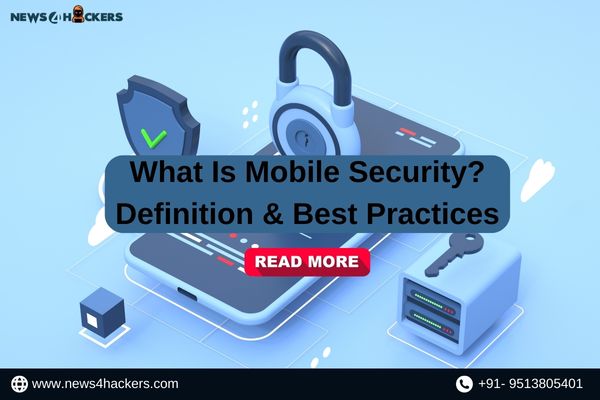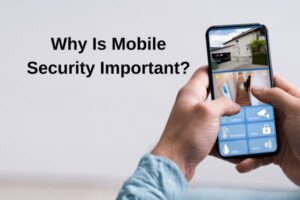What Is Mobile Security? Definition & Best Practices

What Is Mobile Security? Definition & Best Practices
What is mobile security? It is an integral part of a comprehensive digital security plan that aims to safeguard portable devices like smartphones and tablets from cyber threats. Mobile technology is becoming more and more important for both personal and professional communication, as well as for storing data. Furthermore, employees frequently utilize these devices on corporate networks as well. Securing these devices has become increasingly crucial for all businesses, regardless of their size or level of development.

Inadequate mobile security can leave firms vulnerable to many hazards, such as data breaches and financial harm, affecting both employers and employees. Therefore, it is essential for every firm to comprehend and execute mobile security best practices.
What Is Mobile Device Security?
Mobile security, also known as wireless security, encompasses the safeguarding of business and personal data that is transmitted and stored on portable devices such as smartphones, tablets, notebooks, wearables, and similar gadgets. It mitigates the risks, susceptibilities, and assaults that are specific to mobile computing.

Mobile security encompasses numerous facets, including:
| Data protection | Ensuring the prevention of illegal access to sensitive information stored on a device, including personal details, photographs, banking data, and business correspondence. |
| Access control | Enforcing authentication protocols, such as passwords, fingerprints, or two-factor authentication, to limit access to the device and its contents. |
| Application security | Ensuring the security of applications on the device and mitigating any potential risks to the device’s data. |
| Network security | Ensuring the security of the device’s network connections, such as Wi-Fi or cellular networks, to avoid unauthorized interception or impersonation attacks. |
| Physical security | Ensuring the item is protected against physical theft and implementing measures to safeguard it in case it is acquired by unauthorized individuals. |
Why Is Mobile Security Important?
Mobile devices are essential components of contemporary businesses. Mobile devices facilitate employees’ access to company applications and networks. Managers are also content as the employees’ productivity increases when they are granted the freedom to work remotely. This tendency experienced further momentum during and following the pandemic.

Nevertheless, this convenience comes with its own consequences. Unauthorized individuals can exploit unprotected mobile devices to gain entry into a network and its devices, pilfering data and vital information that subsequently results in financial and reputational harm.
Verizon’s 2022 Mobile Security Index reveals that 45% of the firms polled recently encountered mobile-related intrusion, which is nearly double the number reported in the 2021 survey. As per the IBM Cost of a Data Breach Report 2022, the mean overall expense associated with a data breach amounts to $4.35 million. Furthermore, the expenses escalated by an additional $1 million if the breach was connected to remote working.
Mobile security vulnerabilities pose substantial risks to enterprises, including potential data breaches, financial losses, erosion of customer trust, legal ramifications, and decreased productivity:
| Data breach | Mobile devices frequently possess the ability to retrieve confidential company information. If these devices are compromised as a result of malware, phishing, or physical theft, the data contained within them can be exposed. These breaches have the potential to result in monetary losses and harm the reputation of a business. |
| Financial loss | A mobile security compromise can have a significant and immediate financial impact. Businesses may incur costs related to conducting breach investigations, taking prompt countermeasures, and potential regulatory penalties. |
| Productivity loss | In the event that a mobile device is compromised, it may necessitate a significant amount of time to resolve the issue, resulting in decreased productivity. Occasionally, it may be necessary to completely shut down systems to halt the dissemination of infection or to carry out a meticulous examination of digital evidence. |
| Loss of customer trust | One of the most harmful consequences is the potential erosion of client confidence due to a security breach. Should clients perceive a lack of security about their personal data within your organization, they may opt to seek services from alternative providers. |
| Legal consequences | Mobile security breaches could result in legal ramifications for businesses, especially if they result in the disclosure of client data. Businesses are obligated to adhere to data protection standards, and non-compliance can result in substantial legal sanctions. |
Business enterprises may face legal consequences in the event of mobile security breaches, particularly when such breaches lead to the exposure of client information. Organizations have a legal duty to comply with data protection standards; failure to do so may lead to significant legal penalties.
Top Threats to Mobile Security
Mobile security threats present significant hazards for organizations, potentially resulting in compromised data, monetary setbacks, and reduced operational efficiency. In addition, infractions of data protection regulations may result in legal consequences and a decline in consumer confidence. Therefore, in order to safeguard their assets and preserve customer confidence, organizations must incorporate mobile security into the forefront of their cybersecurity strategies.
The following are the five greatest hazards to mobile security.
- Malware and Viruses
Mobile malware and viruses are malevolent software specifically engineered to infiltrate mobile devices without the user’s explicit permission. These can vary from Trojans that masquerade as genuine applications to spyware that covertly collects confidential information. Viruses have the ability to alter or remove data, and can even seize control of fundamental operations of the device.

- Phishing Attacks
Phishing attacks frequently manifest as deceptive letters or emails with the intention of deceiving the victim into divulging important information, such as passwords or credit card numbers. Mobile users are more susceptible to potential harm because of the limited screen size, which hinders their ability to identify deceptive websites or communications.

- Unsecured Wi-Fi Networks
Utilizing public Wi-Fi networks entails a potential hazard, as they frequently lack security measures. This vulnerability enables hackers to intercept the data being transmitted between your device and the Wi-Fi access point, potentially granting them access to sensitive personal and corporate information.

- Mobile Device Theft
The act of physically stealing a gadget not only leads to the loss of the device itself but also all the data contained within it. Inadequate security measures for sensitive data could result in substantial privacy violations.

- Data Leakage
Data leaking can arise from apparently harmless applications that request and acquire access to a greater amount of data than necessary for their functionality. The sensitive data can be transmitted to external computers and utilized for targeted advertising, accessing corporate documents, or for more nefarious intentions.

Brief Overview of Types of Solutions Available
Various technologies and procedures exist to safeguard mobile devices from security threats. To effectively tackle the wide range of risks to mobile security, it is necessary to adopt a comprehensive strategy that incorporates a variety of solutions:
- Antivirus programs aid in the detection and eradication of malware.
- VPNs provide protection for data transmission over unsecured networks.
- Securing device access can be accomplished through the implementation of robust authentication methods, such as biometric or multifactor authentication.
- Encryption tools safeguard sensitive data against unauthorized access.
- Mobile device management (MDM) solutions assist organizations in setting up and protecting the mobile devices of their personnel.
- Phishing attempts are repelled by secure email gateways.
Although each of these tools is advantageous, not all of them are ideal for every sort of business. For instance, numerous lesser enterprises may lack the financial means to acquire an MDM platform or the requisite technical proficiency to implement one. Your team’s optimal mobile security arsenal will ultimately be determined by its budget, capabilities, and specific requirements.
Best Practices for Mobile Security
In order to protect against potential security concerns, it is essential for enterprises and their employees to take safeguards while using mobile devices in the extensive digital environment. These proactive steps, referred to as best practices, are straightforward yet impactful techniques to improve mobile security. From keeping software up to date to promoting user knowledge, each component plays a distinct role in establishing a comprehensive defense for mobile security.

Let us examine these optimal methods that aid in reducing the likelihood of security breaches and safeguarding your personal and professional data.
- Regular software updates: It is important to periodically update your mobile operating system and all of your apps. Updates frequently include security fixes to address recent threats and vulnerabilities.
- Use of strong passwords and two-factor authentication: Enforce robust and distinct passwords for each of your accounts. Activate two-factor authentication to provide an additional level of security.
- Encryption: Employ encryption techniques to safeguard critical data in the event of theft or misplacement. Encryption is the process of transforming understandable data into indecipherable code that is difficult for unauthorized users to decode.
- Secure Wi-Fi connections: Refrain from utilizing public Wi-Fi networks for transactions involving sensitive information. Utilize a Virtual Private Network (VPN) to ensure the security of your connection, if deemed required.
- Installing apps from trusted sources: Exclusively obtain applications from trustworthy sources like the Google Play Store or Apple App Store, and scrutinize user reviews and permissions before installation.
- Regular backups: Ensure to regularly create backups of your data. In the event that your device is misplaced or compromised, you will still have the ability to retrieve your crucial information.
- Using a reliable security app: Install a dependable security application to offer immediate protection against malware, phishing, and other forms of danger.
- Awareness and education: Keep yourself updated on the most recent mobile vulnerabilities and effective strategies to mitigate them. Education is a highly potent means of safeguarding against mobile security concerns.
Wrapping Up
In the bottom line, business networks are experiencing a growing trend of mobile devices being utilized to access business applications that house vital business information. In order to protect against security breaches using mobile devices, it is imperative that mobile security solutions are incorporated as a fundamental component of a business’s comprehensive cybersecurity strategy. It is important for employees to remain updated and adhere to optimal methods in order to guarantee a safe digital encounter.
Moreover, you can have the benefit of learning evening about Mobile Security Best Practices through a dedicated course, namely Mobile Application Security by Craw Security, the Best Cybersecurity Training Institute in India and the sister company of News4Hackers, the leading Cybersecurity Info, and News Portal. To get more information, you can visit the Official Website of Craw Security or give a call to their hotline mobile number +91-9513805401 and initiate a chat with their highly skilled team of counselors.
About The Author:
Yogesh Naager is a content marketer who specializes in the cybersecurity and B2B space. Besides writing for the News4Hackers blog, he’s also written for brands including CollegeDunia, Utsav Fashion, and NASSCOM. Naager entered the field of content in an unusual way. He began his career as an insurance sales executive, where he developed an interest in simplifying difficult concepts. He also combines this interest with a love of narrative, which makes him a good writer in the cybersecurity field. In the bottom line, he frequently writes for Craw Security.
READ MORE NEWS HERE
What Ethical Hacking Skills Do Professionals Need?
The New Secret Code Function of WhatsApp Enables Password Protection for Private Conversations
Japan’s Space Agency Hit by a Cyber Attack, Targets at Active Directory








